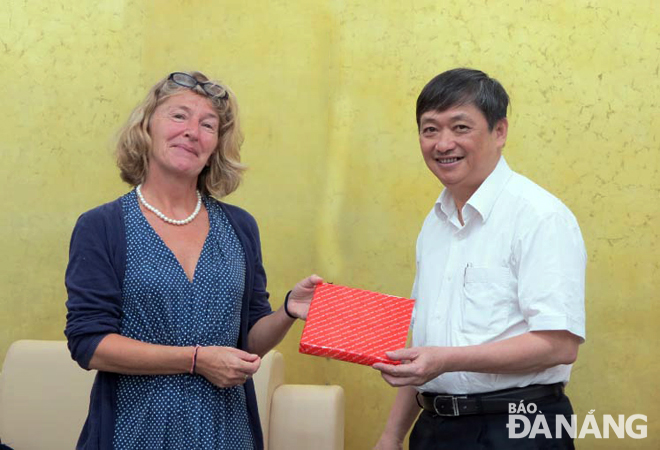EU supports city to develop renewable energy source
During his meeting on Tuesday with Ms Cecile Leroy, Energy Programme Manager of the European Union Delegation to Viet Nam, Da Nang People’s Committee Vice Chairman Dang Viet Dung said his city is targeting to become an environmentally-friendly city in the future.
 |
| Ms Cecile Leroy (left) and Vice Chairman Dung |
Vice Chairman Dung noted that Da Nang’s goal is to increase the use of renewable energy sources, including solar energy, which was considered as one of effective ways to ensure the city's green growth and its sustainable development.
“The EU-funded Da Nang Solar Energy Development (DSED) project is being implemented effectively in the city. The purpose of the project is to raise public awareness about the efficient and economical use of energy, with a focus on encouraging locals to use solar energy, in a bid to mitigate climate change” Mr Dung remarked.
In reply, Manager Cecile Leroy expressed her delight at joining forces with the city leaders to build Da Nang into an environmentally-friendly city. She also believed that increasing the use of renewable energy sources would bring more benefits to Da Nang and other localities nationwide.
The DSED project is running for 40 months, until October 2020, at a cost of 444,169 EUR. Of this, 393,000 EUR is funded by the EU, whilst the remainder comes from the Da Nang Energy Conservation Centre (DECC)’s budget.
Under the EU-funded project, solar panels are being installed on the rooftops of selected families and 5 public buildings in the city.
Besides, DECC’s existing showroom will be upgraded to allow it to acquire modern equipment to demonstrate how solar photo-voltaic panels produce electricity from capturing free-of-charge energy from the sun, as well as net metering which connects the produced energy with the national power grid.
Within the project, the DECC will closely work with the Electricity Regulatory Authority of Viet Nam, the Viet Nam Standards and Quality Institute, the World Bank, and the German Society for International Cooperation in order to attract more overseas investment into the local solar energy sector.